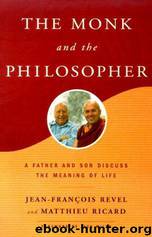The Monk and the Philosopher: A Father and Son Discuss the Meaning of Life by Jean François Revel & Matthieu Ricard

Author:Jean François Revel & Matthieu Ricard
Language: eng
Format: azw3
Tags: Doctrines, Modern, Eastern, Philosophy, Humanism, Buddhism - Doctrines, General, Religion, Buddhism, History & Surveys, Religious, Movements
ISBN: 9780805211030
Publisher: Schocken Books
Published: 2000-02-15T01:44:55+00:00
1. Continuum, New York, 1980.
SEVEN
BUDDISM AND THE WEST
JEAN-FRANÇOIS – All the problems we’ve discussed, everything you’ve explained about Buddhism’s metaphysics, its theory of consciousness, its cosmology, and the repercussions of these great philosophical and metaphysical edifices on the conduct of human life, are still the subjects of living and animated debate among today’s Buddhists. For them, it’s not a matter of the history of philosophy or of ideas, it’s philosophy and metaphysics lived in the present, just as disciples of Socrates and Plato lived them in the fifth and fourth centuries B.C. Public debate of such subjects on any such scale disappeared in the West a long time ago. The philosophies are still there, but that’s no longer how they find expression. It’s true that ‘café philosophers’ have appeared in Paris recently, holding sessions in public, open to all free of charge; but the debate they occasion isn’t often on a much higher level than the talk at the bar. In spite of the West’s undeniable success in other fields and other sectors, could it not be that big missing element – the absence of any discussion worthy of interest – that’s behind the astonishing curiosity Buddhism arouses in the West these days? It makes me think of what the English historian Arnold Toynbee once said, that for historians of the future one of the most significant events of the twentieth century might turn out to be the encounter of Buddhism with the Christian West.
MATTHIEU – I think that all the interest in Buddhism nowadays is due to several factors. First of all, to people who want to commit themselves to the spiritual life and make it a major element in their lives, Buddhism offers not only a living system of metaphysics and wisdom, but also the means by which to integrate that wisdom into their innermost being. Then – and it’s perhaps here that Buddhism has most to offer the West – it provides everyone, believers or not, with a vision of tolerance, open-mindedness, altruism, quiet confidence, a science of the mind through which to find their own inner peace and allow others’ inner peace to blossom. Finally, Buddhism makes its ideas available but doesn’t try to impose them, and even less to convert anyone. It simply offers to share an experience with anyone who wishes.
J.F. – There’s no forced conversion in Buddhism, not even a missionary spirit?
M. – The Dalai Lama often says, ‘I haven’t come to the West to make one or two more Buddhists, but simply to share my experience of the wisdom that Buddhism has developed over the centuries.’ And at the end of his lectures he always adds, ‘If you find anything I’ve said useful, make use of it. Otherwise, just forget it!’ He goes as far as advising Tibetan lamas who travel to different countries not to emphasize the teaching of Buddhism too much, but to offer their experience, as one human being to another. Trying to convert people may not only fail but could also inadvertently weaken their faith in their own religion.
Download
This site does not store any files on its server. We only index and link to content provided by other sites. Please contact the content providers to delete copyright contents if any and email us, we'll remove relevant links or contents immediately.
The remains of the day by Kazuo Ishiguro(8979)
Tools of Titans by Timothy Ferriss(8369)
Giovanni's Room by James Baldwin(7330)
The Black Swan by Nassim Nicholas Taleb(7110)
Inner Engineering: A Yogi's Guide to Joy by Sadhguru(6785)
The Way of Zen by Alan W. Watts(6601)
Asking the Right Questions: A Guide to Critical Thinking by M. Neil Browne & Stuart M. Keeley(5761)
The Power of Now: A Guide to Spiritual Enlightenment by Eckhart Tolle(5760)
The Six Wives Of Henry VIII (WOMEN IN HISTORY) by Fraser Antonia(5503)
Astrophysics for People in a Hurry by Neil DeGrasse Tyson(5182)
Housekeeping by Marilynne Robinson(4436)
12 Rules for Life by Jordan B. Peterson(4299)
Double Down (Diary of a Wimpy Kid Book 11) by Jeff Kinney(4261)
Ikigai by Héctor García & Francesc Miralles(4247)
The Ethical Slut by Janet W. Hardy(4242)
Skin in the Game by Nassim Nicholas Taleb(4239)
The Art of Happiness by The Dalai Lama(4125)
Skin in the Game: Hidden Asymmetries in Daily Life by Nassim Nicholas Taleb(3992)
Walking by Henry David Thoreau(3953)
